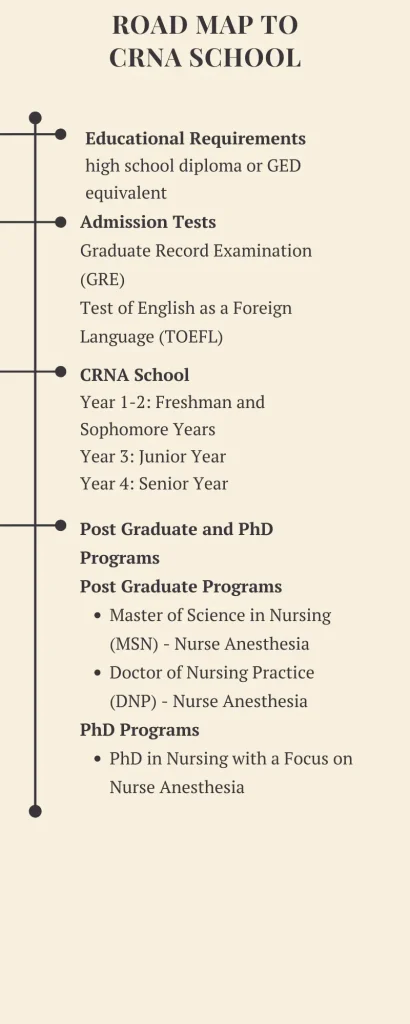How Long is CRNA School
How long is CRNA school? CRNA programs typically take 2-3 years to complete, depending on the specific program and prior educational background. These rigorous programs include both classroom instruction and clinical practice, preparing students for the demanding role of a Certified Registered Nurse Anesthetist.
What is CRNA School
CRNA school is a specialized educational program designed to train registered nurses to become Certified Registered Nurse Anesthetists. These programs typically require a bachelor’s degree in nursing and several years of clinical experience. The curriculum includes advanced coursework in physiology, pharmacology, and anesthesia techniques, as well as extensive hands-on clinical training.

The rigorous training prepares students to administer anesthesia, manage patient care before, during, and after surgical procedures, and handle emergency situations. Graduates of CRNA programs must pass a national certification exam to practice, ensuring they meet high standards of competency and safety in the field of anesthesia.
How Long is CRNA School
CRNA (Certified Registered Nurse Anesthetist) programs are typically graduate-level programs. However, the path to becoming a CRNA starts with an undergraduate degree. Here’s a year-wise explanation of the undergraduate program leading to CRNA school:
Year 1-2: Freshman and Sophomore Years
- General Education Requirements: Students complete foundational courses in subjects such as English, mathematics, and social sciences.
- Introduction to Nursing: Initial nursing courses that cover basic principles of nursing practice, health assessment, and patient care.
- Prerequisite Science Courses: Courses in biology, chemistry, anatomy, and physiology are taken to prepare for more advanced nursing topics.
Year 3: Junior Year
- Core Nursing Courses: Students dive into core nursing subjects, including medical-surgical nursing, pediatric nursing, and obstetric nursing.
- Clinical Rotations: Hands-on clinical experiences begin, allowing students to apply their knowledge in real-world healthcare settings under supervision.
Year 4: Senior Year
- Advanced Nursing Courses: Focus on specialized areas such as critical care, mental health nursing, and community health nursing.
- Capstone Project or Practicum: A culminating project or extensive clinical practicum is completed, demonstrating readiness for professional practice.
- Preparation for Licensure Exam: Students prepare for the NCLEX-RN (National Council Licensure Examination for Registered Nurses) to become licensed RNs.
Upon completing their undergraduate degree and becoming licensed RNs, individuals typically need 1-3 years of critical care nursing experience before applying to CRNA programs.

HOW TO ENTER CRNA SCHOOL
Educational Requirements for CRNA School
Bachelor’s Degree in Nursing (BSN):
Completion of a BSN program from an accredited institution.
Strong academic performance, typically a GPA of 3.0 or higher.
Registered Nurse (RN) Licensure:
Pass the NCLEX-RN to obtain licensure as a registered nurse.
Critical Care Experience:
Minimum of one to two years of full-time work experience in a critical care setting, such as an ICU.
Entry Tests for CRNA School
Graduate Record Examination (GRE):
Some CRNA programs require GRE scores, with a competitive score usually being above the 50th percentile.
Test of English as a Foreign Language (TOEFL):
Required for international applicants whose first language is not English, with minimum score requirements varying by program.
Application Process for CRNA School
- Application Submission:
Complete an application through the program’s website or a centralized application service (e.g., NursingCAS).
- Transcripts:
Submit official transcripts from all post-secondary institutions attended.
- Letters of Recommendation:
Obtain 2-3 letters of recommendation from professional references, preferably from healthcare professionals familiar with your clinical work.
- Personal Statement:
Write a personal statement outlining your career goals, reasons for pursuing a CRNA degree, and relevant experiences.
- Resume or CV:
Include a detailed resume or CV highlighting your educational background, work experience, and any certifications or awards.
- Interview:
Participate in an interview process, which may include both individual and panel interviews.
Financial Aids for CRNA School
Federal Student Aid:
Fill out the Free Application for Federal Student Aid (FAFSA) to determine eligibility for federal loans, grants, and work-study programs.
Scholarships:
Apply for scholarships specifically for nursing or CRNA students offered by professional organizations, universities, and private foundations.
Grants:
Seek out grants from federal and state governments, as well as private institutions, which do not need to be repaid.
Loan Repayment Programs:
Explore loan repayment assistance programs offered by employers, the military, or federal programs such as the National Health Service Corps.
Work-Study Programs:
Participate in work-study opportunities that provide financial assistance in exchange for part-time work related to your field of study.
Post Graduate and PhD Programs
Post Graduate Programs for CRNA School
Master of Science in Nursing (MSN) – Nurse Anesthesia
Duration: Typically 24-36 months.
Curriculum: Includes advanced pharmacology, physiology, and pathophysiology, along with extensive clinical training in anesthesia.
Clinical Hours: Often requires 600-800 clinical hours.
Certification: Prepares students for the National Certification Examination (NCE) to become a Certified Registered Nurse Anesthetist (CRNA).
Doctor of Nursing Practice (DNP) – Nurse Anesthesia
Duration: Typically 36-48 months.
Curriculum: Combines advanced clinical practice with leadership, healthcare policy, and evidence-based practice.
Clinical Hours: Requires up to 1,000 clinical hours.
Capstone Project: Involves a significant project that demonstrates mastery of advanced practice and leadership skills.
PhD Programs for CRNA School
PhD in Nursing with a Focus on Nurse Anesthesia
Duration: Typically 4-6 years.
Curriculum: Focuses on research methodologies, theory development, and academic teaching in nursing and anesthesia.
Dissertation: Requires original research and a dissertation that contributes to the field of nursing and anesthesia.
Career Paths: Prepares graduates for careers in academic research, teaching, and high-level administrative roles.
Top 10 CRNA Schools
Choosing the right CRNA school is crucial for aspiring nurse anesthetists. Here are ten of the top CRNA schools in the United States, known for their rigorous programs and strong clinical training opportunities:

1. University of Pennsylvania School of Nursing
Location: Philadelphia, PA
Program: Doctor of Nursing Practice (DNP) in Nurse Anesthesia
Highlights: State-of-the-art simulation labs, extensive clinical partnerships, and a focus on evidence-based practice.
2. Johns Hopkins University School of Nursing
Location: Baltimore, MD
Program: Doctor of Nursing Practice (DNP) in Nurse Anesthesia
Highlights: Access to one of the nation’s leading medical centers, interdisciplinary training, and strong emphasis on research.
3. Duke University School of Nursing
Location: Durham, NC
Program: Doctor of Nursing Practice (DNP) in Nurse Anesthesia
Highlights: High-fidelity simulation training, a comprehensive clinical curriculum, and leadership development.
4. Rush University College of Nursing
Location: Chicago, IL
Program: Doctor of Nursing Practice (DNP) in Nurse Anesthesia
Highlights: Integrated clinical and didactic curriculum, focus on patient safety, and extensive clinical rotations.
5. University of Pittsburgh School of Nursing
Location: Pittsburgh, PA
Program: Doctor of Nursing Practice (DNP) in Nurse Anesthesia
Highlights: Strong clinical affiliations, robust research opportunities, and emphasis on advanced clinical practice.
6. University of Southern California (USC) School of Nursing
Location: Los Angeles, CA
Program: Doctor of Nurse Anesthesia Practice (DNAP)
Highlights: Innovative curriculum, access to diverse clinical sites, and focus on leadership in healthcare.
7. Virginia Commonwealth University (VCU) School of Nursing
Location: Richmond, VA
Program: Doctor of Nursing Practice (DNP) in Nurse Anesthesia
Highlights: Comprehensive clinical training, strong alumni network, and research-driven education.
8. Boston College William F. Connell School of Nursing
Location: Chestnut Hill, MA
Program: Doctor of Nursing Practice (DNP) in Nurse Anesthesia
Highlights: Focus on clinical excellence, advanced simulation labs, and interdisciplinary learning.
9. Baylor College of Medicine
Location: Houston, TX
Program: Doctor of Nursing Practice (DNP) in Nurse Anesthesia
Highlights: Collaboration with one of the nation’s top medical schools, extensive clinical practice, and research opportunities.
10. Case Western Reserve University Frances Payne Bolton School of Nursing
Location: Cleveland, OH
Program: Doctor of Nursing Practice (DNP) in Nurse Anesthesia
Highlights: Cutting-edge simulation facilities, diverse clinical rotations, and a strong focus on innovation in anesthesia care.
Factors Affecting the Length of CRNA School
The length of CRNA school can vary due to several factors. Here are some key considerations:
1. Program Type
Master’s Degree (MSN) Programs: Typically take about 24-36 months to complete.
Doctor of Nursing Practice (DNP) Programs: Usually last 36-48 months, reflecting the higher level of training and additional coursework.
2. Program Structure
Full-Time vs. Part-Time: Full-time programs allow students to complete their studies more quickly than part-time programs.
Online vs. On-Campus: Some programs offer online coursework, which can provide flexibility but may also extend the program length due to part-time study options.
3. Clinical Hours Requirement
Programs require a significant number of clinical hours (600-1,000), which can affect the duration depending on how quickly these hours are accumulated.
4. Curriculum and Coursework
Advanced Courses: The inclusion of extensive coursework in advanced physiology, pharmacology, and anesthesia techniques can lengthen the program.
Capstone Projects: DNP programs often require a capstone project, adding time to the completion of the degree.
5. Prior Educational Background
Bachelor’s Degree: Having a BSN is typically required, but some programs may offer accelerated paths for those with a related background.
Previous Experience: Programs may offer credit for previous clinical experience, potentially shortening the required clinical hours.
6. State Regulations and Accreditation Standards
Different states and accrediting bodies have varying requirements for program length and clinical practice hours, impacting the overall duration.
Final Verdict
The length of CRNA school varies based on program type, structure, and individual circumstances. Typically, MSN programs take 24-36 months, while DNP programs require 36-48 months. Key factors include clinical hours, coursework, and personal commitments. Prospective students should carefully consider these aspects to plan effectively.
FAQs
What are the educational requirements for CRNA school?
Typically, a bachelor’s degree in nursing (BSN), RN licensure, and 1-2 years of critical care experience are required.
How long does it take to complete CRNA school?
MSN programs generally take 24-36 months, while DNP programs range from 36-48 months, depending on the program type and structure.
What is the difference between an MSN and a DNP in Nurse Anesthesia?
An MSN focuses on advanced clinical practice, while a DNP includes additional coursework in leadership, healthcare policy, and may require a capstone project.
What exams are required to become a CRNA?
Graduates must pass the National Certification Examination (NCE) administered by the National Board of Certification and Recertification for Nurse Anesthetists (NBCRNA).
How competitive is admission to CRNA programs?
Admission is highly competitive due to the rigorous prerequisites, including GPA, critical care experience, GRE scores (where required), and strong letters of recommendation.
